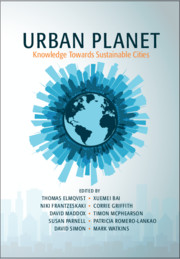Cities have always been fundamental to the development and dynamic of the Arab world, which was only recently divided into nation states. However, when compared to cities in other regions, Arab cities are underresearched. The little data that is publically available on the Arab world is typically published by national government bodies and is thus focused on the national level. I was recently shocked when I could not find basic GDP data for a specific Arab capital city; all I could find were national statistics. The challenge of data availability is manifold, as it relates to the existence of comparable city-level data, to its public dissemination, and to the extraction of knowledge from this data. This chapter will focus on the first two aspects of the challenge: the creation and dissemination of data.
There are a number of emerging trends that will help nudge Arab cities towards action on this front. As cities compete regionally and globally for foreign investment, tourism, and talent, they will have to begin collecting and sharing data specific to their cities in order to better market themselves. Additionally, an increasing number of Arab cities are joining international networking and reporting initiatives, such as the C40 Climate Leadership Group (for example, Amman, Dubai) and the 100 Resilient Cities Challenge (for example, Byblos, Ramallah). These forums encourage cities to collect and share a wide range of data to inform city-level strategies and, ultimately, to contribute to global knowledge of cities. There is also a growing amount of spatial satellite data becoming publically available through research organizations (for example, the recent map of air pollution compiled by the Yale Environmental Performance Index). These data can act as incentives for cities to collect and share their own “bottom-up” data, or at least to better understand the existing data.
Where should cities begin on their journey of data collection? The recently released ISO 37120 (2014) standard sets out a series of indicators for city services and quality of life. These address strategic themes such as economy, health, environment, and governance, all of which are important aspects for cities regardless of scale or geography. Using this standard as a guide will allow cities to compare their performance against other cities, helping ensure that the data generated is meaningful and can catalyze action. The CDP (2016) questionnaire is another helpful guide, particularly on emerging topics such as climate change adaptation.
Much of this information may already exist within one or more city department. Depending on the ease of access, format, and accuracy of this data, the city can decide whether to use the existing data collection processes or to set up new ones. Cities may also decide to set up independent bodies for the collection and dissemination of this data or to delegate this responsibility to existing relevant authorities. When making this decision, it is important to keep in mind the strong tendency for individuals and organizations to be protective of their information. Setting up dedicated data collection entities may ultimately be the easier option.
The Abu Dhabi Spatial Data Infrastructure (n.d.) initiative, called AD-SDI, provides an example of a coordinated government effort to collect and share spatial data across entities. Currently, some of the data is also made available to the public. The AD-SDI is administered through the Abu Dhabi Systems and Information Centre and relies on the data contributions of over 60 government and semi-government stakeholders. As described in the initiative’s vision and illustrated in Figure 34.1, data are collected at a department level across all the involved stakeholders. It is then shared with and analyzed by an interdisciplinary strategic policy government body. Finally, the data are communicated to the Executive Council and are used to track performance against the emirate’s social, economic, and environmental vision. Each level is a two-way process, whereby the providers of data are simultaneously responding to and influencing a brief. It would be exciting to see this model applied at a wider scale, such that all the data collected can be influenced by and made available to the private sector, academia, and the wider public.

Figure 34.1 The Abu Dhabi Spatial Data Infrastructure Initiative’s vision
Herbert Girardet (Reference 407Girardet2014) described most urbanists as living in a “pre-Galilean” time where the city is the center of the universe; as we dig deeper into understanding the dynamics within a city, we must be cautious of falling into this trap. For example, even the most self-sufficient and sustainable cities rely on agricultural areas outside their borders, and often in other continents, to supply their food. Only by acknowledging and understanding this dependence on other systems can cities address their areas of vulnerability and build resilience in their own systems. City databases should extend to relevant data beyond the boundary of the city in order to provide policy-makers and the public with a full picture.
With the availability of a new generation of data collection and dissemination technology, Arab cities have the opportunity to set up their databases to make the most of this technology now, rather than having to retrofit later. What we need in order to develop truly sustainable and resilient cities is data that is accurate, up to date, and available – not just at the national level, but at the city level. We are fortunate to live in an age where this is an achievable goal.




